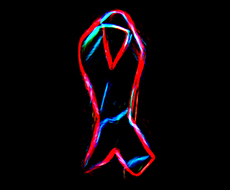
Today as we unite in the fight against HIV, on World AIDS Day, we remember those who have died from HIV/AIDS, and commit to do more for those who currently are living with HIV. It’s encouraging that we now have a , which aims to reduce new infections, offer broader access to life-saving treatment, and eliminate on-going discrimination against people living with HIV. While it’s true, as the federal government recognizes, that ending discrimination could help encourage more people to be comfortable getting tested for HIV, that’s not why we at the ACLU think ending discrimination is so important. As the National AIDS Strategy rightly says, “[t]o be free of discrimination on the basis of HIV status is both a human and a civil right.”
While we’ve made significant progress in eliminating stigma and discrimination, unfortunately, we still have far to go. We don’t need to look any farther than Alabama, which has the dubious distinction of being one of two states that continues to force prisoners living with HIV to live in special segregated housing. The effects of this segregation are far-reaching – the very act of assignment to the “AIDS dorm” discloses inmates’ HIV status to other inmates, their families, and their communities. Inmates with HIV are kept out of work-release programs by arbitrary criteria that aren’t based on medical standards. And they are even categorically excluded from other important rehabilitative and re-entry programs, including residential drug treatment programs, as well as such highly-coveted privileges as housing in the faith-based dorms and honor dorm. There’s no good reason why prisoners with HIV should be segregated, as other prison systems in the country recognize. The ACLU National Prison Project and AIDS Project, along with the ACLU of Alabama, have challenged the Alabama policy in court. Right now, we’re waiting for a judge’s decision on the state’s motion to dismiss our case.
We know that much of the discrimination faced by people with HIV is rooted in fear – fear of what it means to live with HIV, and fear based on a lack of knowledge about how HIV is and isn’t transmitted. As a society, we need to do more to combat this misinformation. But when our own government perpetuates discrimination against people with HIV, as the Alabama prison policy does, it sends a message that HIV disease is something so fearful that people with HIV literally need to be kept apart from others. That’s why this World AIDS Day, we renew our pledge to fight government discrimination against people with HIV, and dismantle the remaining barriers to fairness and full equality for people living with HIV.
Learn more about HIV/AIDS discrimination: Sign up for breaking news alerts, , and .

